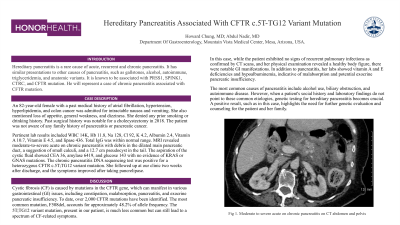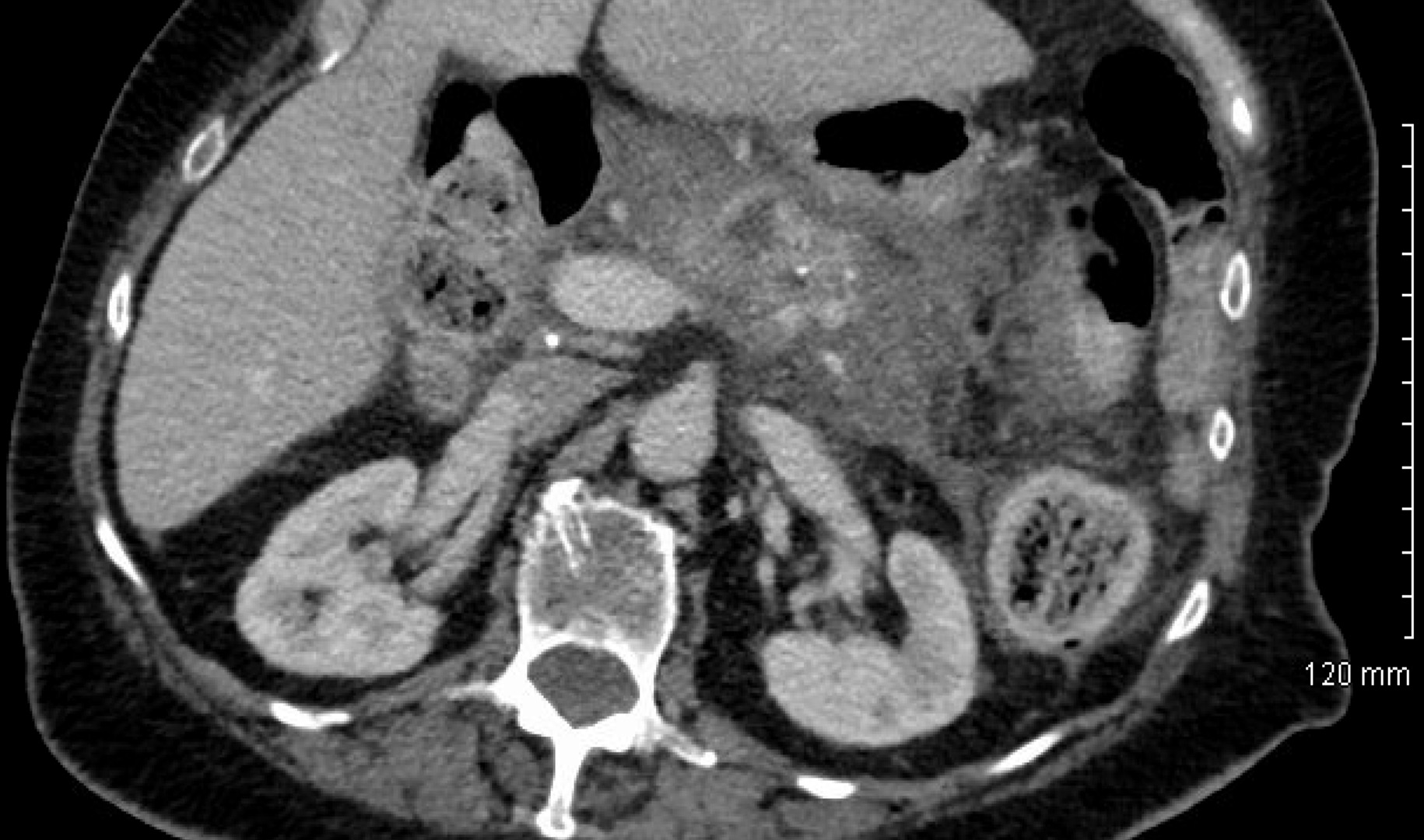Tuesday Poster Session
Category: Biliary/Pancreas
P3529 - Hereditary Pancreatitis Associated With CFTR c.5T-TG12 Variant Mutation
Tuesday, October 29, 2024
10:30 AM - 4:00 PM ET
Location: Exhibit Hall E

Has Audio

Howard Chung, MD
Mountain Vista Medical Center
Mesa, AZ
Presenting Author(s)
Howard Chung, MD, Abdul Nadir, MD
Mountain Vista Medical Center, Mesa, AZ
Introduction: Hereditary pancreatitis is a rare cause of acute, recurrent and chronic pancreatitis. It has similar presentations to other causes of pancreatitis, such as gallstones, alcohol, autoimmune, triglyceridemia, and anatomic variants. It is known to be associated with PRSS1, SPINK1, CTRC, and CFTR mutation. He will represent a case of chronic pancreatitis associated with CFTR mutation.
Case Description/Methods: An 82-year-old female with a past medical history of atrial fibrillation, hypertension, hyperlipidemia, and colon cancer was admitted for intractable nausea and vomiting. She also mentioned appetite, general weakness, and dizziness. She denied any prior smoking or drinking history. Past surgical history was positive for cholecystectomy in 2018. The patient was not aware of any family history of pancreatitis or pancreatic cancer.
Pertinent lab results included WBC 14K, Hb 11.8, Na 128, Cl 92, K 92, Albumin 2.4, Vit A 10.7, Vit E 4.5, and lipase 436. Total IgG was within normal range. MRI revealed moderate-to-severe acute on chronic pancreatitis with debris in the dilated main pancreatic duct, a suggestion of small calculi, and a 12.7 cm pseudocyst of the tail. The aspiration of the cystic fluid showed CEA 36 amylase 6419 and glucose 143 with no evidence of KRAS/GNAS mutation. The chronic pancreatitis DNA sequencing test was positive for heterozygous CFTR c.5T;TG12 variant mutation. She followed up at our clinic two weeks after discharge, and the symptoms improved after taking pancrelipase.
Discussion: Cystic fibrosis (CF) is caused by CFTR mutation, which can manifest as constipation, malabsorption, pancreatitis, and exocrine pancreatic insufficiency in the GI system. Over 2000 CFTR mutations have been identified. The most common one is F508del, which accounts for approximately 48.2% of allele frequency. Variant 5T;TG12 mutation is far less common and can lead to various clinical consequences of CF. In our case, there was no evidence of recurrent pulmonary infections from CT, and PE showed a healthy body figure. However, besides pancreatitis, her lab also revealed vitamin A and E deficiency and hypoalbuminemia.
The most common etiologies of pancreatitis include alcohol, biliary obstruction, and autoimmune. Still, pancreatitis sequencing tests should be considered to rule out hereditary pancreatitis in patients with negative associated social history and lab findings. If the test is positive, further genetic tests and counseling services should also be provided to the patients and their families.

Disclosures:
Howard Chung, MD, Abdul Nadir, MD. P3529 - Hereditary Pancreatitis Associated With CFTR c.5T-TG12 Variant Mutation, ACG 2024 Annual Scientific Meeting Abstracts. Philadelphia, PA: American College of Gastroenterology.
Mountain Vista Medical Center, Mesa, AZ
Introduction: Hereditary pancreatitis is a rare cause of acute, recurrent and chronic pancreatitis. It has similar presentations to other causes of pancreatitis, such as gallstones, alcohol, autoimmune, triglyceridemia, and anatomic variants. It is known to be associated with PRSS1, SPINK1, CTRC, and CFTR mutation. He will represent a case of chronic pancreatitis associated with CFTR mutation.
Case Description/Methods: An 82-year-old female with a past medical history of atrial fibrillation, hypertension, hyperlipidemia, and colon cancer was admitted for intractable nausea and vomiting. She also mentioned appetite, general weakness, and dizziness. She denied any prior smoking or drinking history. Past surgical history was positive for cholecystectomy in 2018. The patient was not aware of any family history of pancreatitis or pancreatic cancer.
Pertinent lab results included WBC 14K, Hb 11.8, Na 128, Cl 92, K 92, Albumin 2.4, Vit A 10.7, Vit E 4.5, and lipase 436. Total IgG was within normal range. MRI revealed moderate-to-severe acute on chronic pancreatitis with debris in the dilated main pancreatic duct, a suggestion of small calculi, and a 12.7 cm pseudocyst of the tail. The aspiration of the cystic fluid showed CEA 36 amylase 6419 and glucose 143 with no evidence of KRAS/GNAS mutation. The chronic pancreatitis DNA sequencing test was positive for heterozygous CFTR c.5T;TG12 variant mutation. She followed up at our clinic two weeks after discharge, and the symptoms improved after taking pancrelipase.
Discussion: Cystic fibrosis (CF) is caused by CFTR mutation, which can manifest as constipation, malabsorption, pancreatitis, and exocrine pancreatic insufficiency in the GI system. Over 2000 CFTR mutations have been identified. The most common one is F508del, which accounts for approximately 48.2% of allele frequency. Variant 5T;TG12 mutation is far less common and can lead to various clinical consequences of CF. In our case, there was no evidence of recurrent pulmonary infections from CT, and PE showed a healthy body figure. However, besides pancreatitis, her lab also revealed vitamin A and E deficiency and hypoalbuminemia.
The most common etiologies of pancreatitis include alcohol, biliary obstruction, and autoimmune. Still, pancreatitis sequencing tests should be considered to rule out hereditary pancreatitis in patients with negative associated social history and lab findings. If the test is positive, further genetic tests and counseling services should also be provided to the patients and their families.

Figure: moderate to severe acute on chronic pancreatitis on CT abdomen and pelvis
Disclosures:
Howard Chung indicated no relevant financial relationships.
Abdul Nadir indicated no relevant financial relationships.
Howard Chung, MD, Abdul Nadir, MD. P3529 - Hereditary Pancreatitis Associated With CFTR c.5T-TG12 Variant Mutation, ACG 2024 Annual Scientific Meeting Abstracts. Philadelphia, PA: American College of Gastroenterology.
